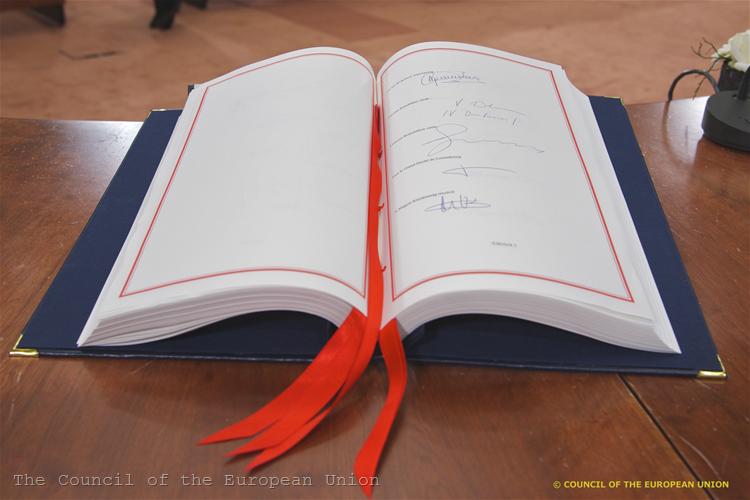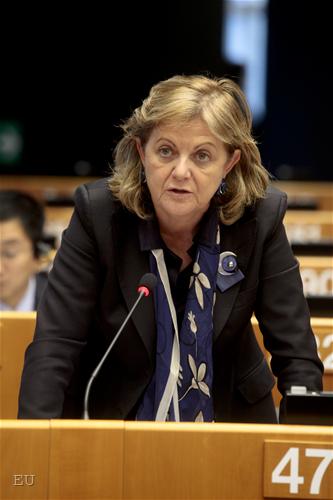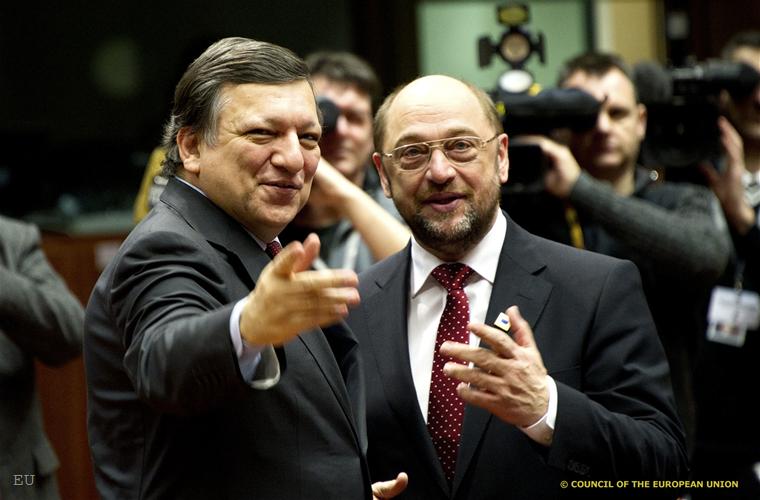Draft 4: the European Parliament and the Non-Euro Countries Have Won
Adelina Marini, Ralitsa Kovacheva, January 20, 2012
 The draft of the fiscal pact of the EU is beginning to resemble something final, judging from the fourth draft, which leaked late on Thursday in British daily The Telegraph. If the previous three times the text changed starting with the title and going through changes of the subtitles, now the main title remains the same - Treaty for Stability, Coordination and Governance of the Economic and Monetary Union, and the subtitles also remain unchanged. There are, however, some novelties, which deserve special attention and this is what we will attempt to do in the following lines.
The draft of the fiscal pact of the EU is beginning to resemble something final, judging from the fourth draft, which leaked late on Thursday in British daily The Telegraph. If the previous three times the text changed starting with the title and going through changes of the subtitles, now the main title remains the same - Treaty for Stability, Coordination and Governance of the Economic and Monetary Union, and the subtitles also remain unchanged. There are, however, some novelties, which deserve special attention and this is what we will attempt to do in the following lines.
The European Parliament can claim victory
Strasbourg's three negotiators probably will be applauded next time when they meet their colleagues in the European Parliament, because they have managed to pass a large part of the demands of this institution in the fourth draft. If before it was envisaged the European Parliament to be only informed by the eurozone president, now it is written that Parliament's chief may be invited for a hearing, but also the president of the euro area summit will present a report in the European Parliament after each summit. This is a huge progress in comparison to the previous drafts, in which the role of the only institution with directly elected by the European citizens members was constantly moved to the sidelines.
A very significant victory for the European institutions is some important details not to be enshrined in the very text of the Treaty but after its entering into force to be proposed by the European Commission as a secondary legislation, which will make them part of the European law. For example, an ex ante reporting of debt emissions plans, which until now was mentioned in a separate text in the draft. The Commission will propose programmes too, for economic partnership of the eurozone countries in excessive debt procedure, coordination of main economic policies of the euro area members.
The European Parliament can congratulate itself for another achievement too - its role in the communication between the participant countries and national parliaments. The MEPs criticised the third draft of the pact because it was envisaged national parliaments to communicate with the member states but without Strasbourg's participation. In the previous draft it was written: "Representatives of the Parliaments of the Contracting Parties will be invited to meet regularly to discuss in particular the conduct of economic and budgetary policies, in close association with representatives of the European Parliament". In the latest draft it is said: "The European Parliament and the national Parliaments of the Contracting Parties will TOGETHER determine the organisation and promotion of a conference of the chairs of the budget committees of the national Parliaments and the chairs of the relevant committees of the European Parliament".
And another demand of the institution is taken into account in the fourth text. The MEPs put into question the need of a fiscal pact a number of times, given that in the autumn of 2011 the reform of EU's economic governance has been approved. Yet in the preamble it is added that progress on the implementation of the mid-term objectives will be assessed on the basis of an overall estimation of the structural balance, including an analysis of expenditure net of discretionary revenue measures, in line with the European Union's legislation, especially that part of it which is related to the strengthening of the surveillance of budgetary positions and the surveillance and coordination of budgetary policies.
It is obvious, though, that the European Parliament's demand the countries to commit themselves to measures for closer convergence and greater competitiveness has not been taken into account, including for a common redemption fund, European project bonds, financial transactions tax and a road map to introduce stability bonds.
Unlike the European Parliament, it can be said that the president of the Eurogroup (the ministers of finance of the euro area) suffered a defeat. It was envisaged the president (at the moment this is Luxembourg's prime minister Jean-Claude Juncker) to take part on an equal footing in the eurozone summits, together with the European Commission president. In draft 4, however, he is excluded from the summits and it is stated that he MAY be invited to attend the summits, when there is a need of his contribution for the preparation and a follow up of the summits. In other words the Eurogroup will assist for the organisation of the summits but its chief may be invited or may be not.
At the European Council on October 26 the leaders have decided that the euro area needs a president, but for now this function will be played by European Council President Herman Van Rompuy until a new one is elected. With this Jean-Claude Juncker's role, who chairs the eurozone finance ministers meetings, has been significantly reduced, which is deemed to be a result of his constant confrontations with German Chancellor Angela Merkel. Jean-Claude Juncker is one of the veteran politicians in the European Union at the moment and until recently had a significant influence in the decision-making.
In this same chapter, related to the euro area governance, a big benevolence is enshrined for non euro area countries. For them it is envisaged, but given they ratify the fiscal pact, to be invited, when appropriate to discuss specific issues on the implementation of the Treaty, to take part in eurozone summits. Furthermore - more than once a year. The option a non euro area country to ask voluntarily, before joining the eurozone, to apply the entire or part of the provisions in the Treaty has remained too.
Another very important change, related to the non-euro countries is that those with derogation or exemption will after all get special treatment. This is written in an entirely new text, which starts with dots, which might mean that these countries will be specifically named: "NOTING that … are Contracting Parties whose currency is the euro and that, as such, they will be bound by the provisions of this Treaty from the first day of the month following the deposit of their instrument of ratification if the Treaty is in force at that date; NOTING ALSO that all other Contracting Parties are, at the date of signature of this Treaty, Member States of the European Union with a derogation or an exemption from participation in the single currency and may be bound, as long as this derogation or exemption is not abrogated, only by those provisions of Titles III and IV [Fiscal Pact and Economic Policy Coordination and Convergence"] by which they declare, on depositing their instrument of ratification or at a later date, that they intend to be bound".
Countries with derogations are all who joined the European Union in 2004 and 2007 and are not yet eurozone members. Countries with exemption are, for example, Britain and Denmark, which have explicitly stated that they do not want to share a common currency with their partners from the EU. This new text is very important because it reflects the negotiators' willingness to make courtesy to Britain, which firmly refused to take part in the fiscal pact but to Denmark too, which demonstrated reluctance because it considers that a substantial part of the proposed in the fiscal pact measures have been for a long time enshrined in its national legislation.
Slight changes in the fiscal pact
In Title III, dedicated entirely on the fiscal pact, the big ambiguity has been cleaned up, created with the previous draft in Article 7, where the very odd citing of "apparent" majority is removed from the reverse voting procedure. In the new draft the word "established" is used. In Version 3 it was said that the contracting parties from the eurozone commit to apply the proposals and recommendations of the European Commission when the Commission has registered a breach of the deficit criterion within the excessive deficit procedure. This obligation, however, can be rejected by reverse voting if, as was written in Version 3, it is "apparent" that among the eurozone countries there is qualified majority with "different view".
In Version 4 the text is much more precise and clear: "This obligation shall not apply where it is ESTABLISHED among the Contracting Parties whose currency is the euro that a qualified majority of them, calculated by analogy with the relevant provisions of the European Union Treaties without taking into account the position of the Contracting Party concerned, IS OPPOSED TO THE DECISION PROPOSED OR RECOMMENDED".
Fines for non-adhering countries with the European Court of Justice decisions
Article 8, which defines the role of the European Court of Justice, has expanded from only one text to 3 entire paragraphs, in which it is described very thoroughly under what conditions a member state can be brought to the European Court of Justice for non-adherence to its commitments with this pact. The European Commission still is with restricted functions, unlike Draft 2 where it was allowed to bring cases to the court on behalf of the member states. A novelty is that the non-adherence with a binding decision of the court will be punished with a fine, which should not exceed 0.1% of gross domestic product. Moreover, the sum will be directly paid to the rescue fund - the European Stability Mechanism.
The Euro Plus Pact is no longer defining
In the previous version of the document it was written that the participant countries will undertake the necessary actions to coordinate their economic policies and for economic convergence, according to the Euro Plus Pact. In Draft 4, however, the pact is not mentioned, but instead it is stipulated: "The Contracting Parties shall take the necessary actions and measures in all the domains which are essential to the good functioning of the euro area in pursuit of the objectives of fostering competitiveness, promoting employment, contributing further to the sustainability of public finances and reinforcing financial stability."
The Euro Plus Pact is not entirely abolished, though. Again in the preamble it is not just mentioned but the text is much more precise. In the third version it was recalled that the heads of state and government agreed on 26 October 2011 to improve the euro area governance, including through adopting the Euro Plus Pact on 25 March 2011. In the fourth version it is added: "which identifies the issues that are essential to fostering competitiveness in the euro area".
There are several small but substantial changes in the fourth draft, for example the important clarification in Article 11, which is no longer talking about "working toward a common economic policy" but to "closely coordinated economic policy". In the previous version it was written that applying the fiscal pact was a condition to receive financial assistance from the ESM, while now the condition is the pact to be ratified. Moreover, it is required, aside from being ratified, to be transposed into national legislation too in the deadline defined, which is 1 March 2013 [it has to be noted that this deadline is kept in Version 4].
The proposed with the previous version number of 12 ratifications is also kept, needed for the entry into force of the Treaty. What remains too is the 5-year term for the incorporation of the provisions of the Treaty into EU's legislation.
 | © The Council of the European Union
| © The Council of the European Union | © European Parliament
| © European Parliament | © The Council of the European Union
| © The Council of the European Union | © European Parliament
| © European Parliament | © EU
| © EU | © EU
| © EU